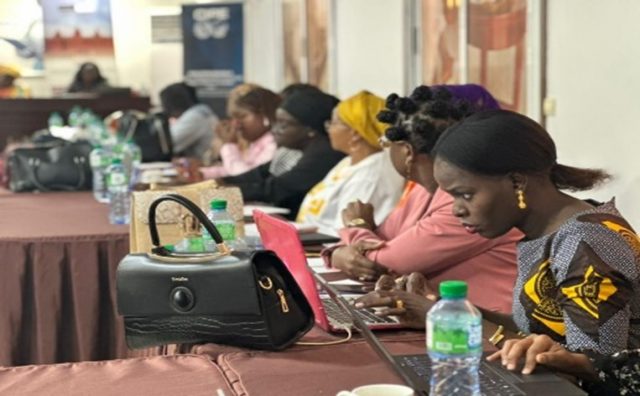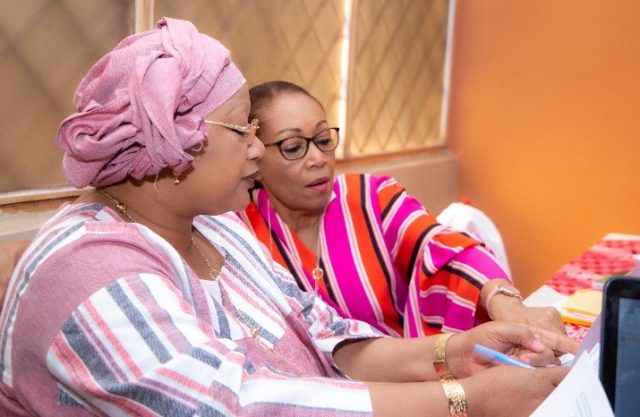In the heart of the Sahel, a region beset by political instability and violent extremism, women leaders are powerful agents of change.

Coups in Niger, Mali and Burkina Faso challenge democratic institutions and stifle voices for tolerance and inclusivity. Girls and women face disproportionate challenges, including limited political representation, restricted access to formal employment, and rising rates of gender-based violence. Additionally, patriarchal interpretations of religious texts and socio-cultural constraints tend to exclude women from economic development and political participation. To address these issues, CIPE is working to help Sahelian women leaders voice their priorities and recommendations at a regional level, to promote equality and inclusivity in economics and politics, and to ensure safe schools and positive community values.
Women’s leadership in politics and the economy counters extremist narratives and is increasingly important as men become absent due to conflict or economic migration. Women are assuming household leadership roles and gaining significant influence.
Businesswomen Spur Change
Specifically, businesswomen are at the forefront of this transformative movement. As the Sahel faces a confluence of crises, local businesses struggle to create jobs and generate wealth. Local businesses experience the most drastic economic impacts of violent conflict and extremism, but they are also well-positioned to propose sustainable solutions. Women business leaders are advocating for women’s economic inclusion and pushing for greater access to high-level decision-makers, all while uniting diverse groups to drive impactful changes. Gender parity laws, such as the 2018 Law on Gender Parity in Elected Assemblies in Mauritania or the 2019 Gender Quota Law in Chad, have increased women’s representation in leadership positions and politics.
Yet, despite these advancements, there’s still much work to be done. As of 2022, the most recent year for which statistics are available, women occupy only 20 percent of ministerial positions in Mauritania, Burkina Faso, Mali, Niger and Chad.
CIPE’s Sahel team, working through the National Endowment for Democracy (NED) funded “Sahel Women” project, promotes women’s grassroots leadership in countering violent extremism. Specific activities include establishing a regional women’s coalition, led by women with backgrounds in conflict-affected communities. This coalition of women leaders from the private sector, civil society, and political parties from Mauritania, Chad, Mali, Niger, and Burkina Faso provides a platform to engage in dialogue and advocacy with regional institutions.
Women Leaders Want Political, Social and Economic Inclusion
The coalition met several times to outline priority areas for women’s leadership in the region. At the Sahel Women Regional Conference in Nouakchott, Mauritania, in December 2023, the group identified three key priorities: social inclusion, economic inclusion, and political participation.

Within these priorities, the women agreed that improved access to finance and education would promote social inclusion by bolstering women leaders and expanding leadership opportunities. For economic inclusion, the group prioritized professional development programs to enhance women’s entrepreneurial skills. The coalition highlighted the significant gap in female representation within political bodies and organizations to illustrate the need for political participation.
Next Step: Creating an Advocacy and Action Network
The coalition met again in June 2024 in Dakar, Senegal, and identified 15 actionable recommendations based on the identified priorities, then began forming an ongoing advocacy and action network. Some of the actions identified included training opportunities for women who go into politics, to propose laws that benefit women, and identifying business associations that can foster the next generation of women leaders and entrepreneurs. These actions will also be shared with other regional women’s groups. The women leaders called on governments and the international community to double their efforts to maintain progress and warned of potential setbacks to women’s rights in several countries due to challenges in democratic systems.
While there is still a long road ahead to gender parity both in the Sahel and globally, the Sahelian women leaders’ dedication demonstrates the transformative potential of grassroots leadership. The recommendations they identified are a vital roadmap for continued advocacy.
Published Date: August 07, 2024
